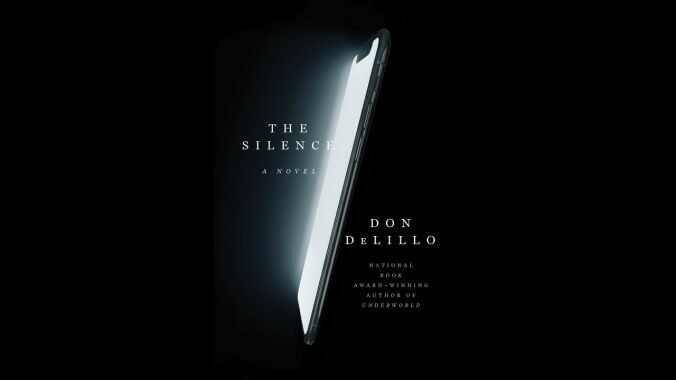The lights go out in Don DeLillo’s familiar yet slight The Silence

Over the past half-century, Don DeLillo has explored, in fiction that often feels presciently real, “the strangest, wildest, freakingest country in history,” as he called it back in his first novel, Americana. From the very beginning, the same set of themes has underscored DeLillo’s dark vision of American life: Omnipresent war and violence. Crude and cruel sex. The heroics and horror of professional and collegiate sports. The terror of art and modern consumer culture. The irrationality of language and science. The dread of imminent death. The anxiety of the present, the paranoia that tomorrow brings.
And now comes The Silence, DeLillo’s 17th novel (18th, if you count Amazons, his pseudonymous, generally unacknowledged “memoir” written by the first woman to play professional hockey).
The Silence is slight. Slight in the way that much of DeLillo’s post-Underworld output, especially Point Omega and The Body Artist, have felt slight. Slight in page count, yes. In plotting? Yes. Slight in humor? Yes, defiantly so. (Oh, how one wishes for the wickedly farcical DeLillo of Running Dog and Cosmopolis!). This new novel isn’t prime DeLillo, but it’s definitely not not DeLillo-esque: in ideas, in tone, in the way his characters think and act and, most notably, speak. There’s a whole world of DeLillo in these 116 pages. Yet, that might not be enough.
A pair of New York City couples plan to get together on Super Bowl Sunday 2022. (If you believe, like many do, that DeLillo’s novels often prophesy the future, bet on the Titans versus the Seahawks in Super Bowl LVI.) Hours before kickoff, an airplane carrying one of the couples crash-lands. Unaware of their friends’ plight, the second couple, joined by a guest, settle in for the game. But just as the teams are trotting onto the field, “The images onscreen began to shake. It was not ordinary visual distortion, it had depth, it formed abstract patterns that dissolved into a rhythmic pulse, a series of elementary units that seemed to thrust forward and then recede.” The screen fizzles to gray. The landline goes dead. Their computers, lifeless. The world, silent. Is it the Russians, they wonder. The Chinese? A harbinger of WWIII? A satellite malfunction? A sunspot? Cyberattack? Aliens?
Trapped, with nothing to occupy their attention but each other, the three are forced to talk, in the way DeLillo characters always talk: over, around, and through, anything but to each other. DeLillians don’t converse, they announce, they broadcast. They hit all of DeLillo’s sweet spots here. One takes refuge in a memory of a Roman vacation: “Jesus in the churches and on the walls and ceilings of the palazzos.” Another says apropos of nothing, “Do not read subtitles… We want pure film, pure language.”
The third gazes into the television’s blank screen and begins speaking in tongues, live-streaming the invisible transmission: “Perpetual Postmortem Financing. Start your exclusive arrangements online… Play resumes, quarter two, hands, feet, knees, head, chest, crotch, hitting and getting hit. Super Bowl Fifty-Six. Our National Death Wish.”
There’s a knock at the door. The other couple has survived the crash. The hospitals are full. The city is dark. “What if all this is some kind of living breathing fantasy,” one asks. “What comes next?” What comes next is a litany of man’s misfortunes recited by the five characters “in the grip of serious threat”—pure DeLillo, DeLillo distilled:









![HBO teases new Euphoria, Larry David, and much more in 2026 sizzle reel [Updated]](https://img.pastemagazine.com/wp-content/avuploads/2025/12/12100344/MixCollage-12-Dec-2025-09-56-AM-9137.jpg)






























